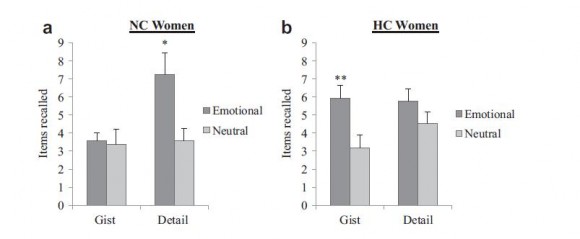graphic courtesy of Nielsen, Ertman, Lakhani and Cahill, 2011.
Naturally cycling (NC) women showed enhanced memory for detail for the emotional story compared with the neutral, while their memory for gist for both stories was similar. Women on hormonal contraceptives (HC) demonstrated the opposite effect.
It isn’t all about sex. But it is about sex hormones.
Scientists found evidence that the levels of estrogen and progesterone in women affect their memory for an emotional event. In a recent study using a story stimulus, women taking combined hormonal contraceptives had an enhanced memory for gist, or central story information, while naturally cycling women showed an enhanced memory for nonessential story details. In neither case did the women experience impaired memory.
Shawn Nielsen, a graduate student at the University of California, Irvine, led the research. The results indicate that emotional memory is not dependent only on sex, but rather the level of sex hormones in any person.
“If you’re comparing men and women, a lot of people will say … men typically do this and women typically do this, but now we have two groups of women where one has … altered sex hormones,” Nielsen said. “I think that’s a really powerful tool to get away from the stereotypes and say it [actually] has to do with what the sex hormone really looks like in your body, how that’s affecting what’s happening when you come away from an emotional event, what you remember [and] how you learn different material.”
Other studies have shown that the interactions between sex and stress hormones cause people to remember emotional events better than neutral events. That idea formed the basis for Nielsen’s experiment. “When you alter your sex hormone axes, you appear to also be altering what other things do in your body, so for example, your stress response,” Nielsen said.
In the experiment, both naturally cycling women and those on hormonal contraceptives watched either an emotionally charged or neutral slide show. The pictures in both slide shows were the same, but the narratives differed. In the neutral version, a mother and son witness a car accident and then go to the hospital to practice a disaster drill. In the emotional story, the car hits the son and the mother takes him to the hospital where doctors reattach his severed feet.
One week after participants saw the slide show, researchers gave them a surprise recall test. Naturally cycling women who watched the emotional story remembered more details than those who watched the neutral story, while both groups had a similar memory for gist. Conversely, all the women on hormonal contraceptives showed similar recall for details regardless of which story they saw, but those that watched the emotional version showed an enhanced memory for gist. The study did not indicate whether the enhanced gist or detail memory was related to sex hormone effects on the encoding or on the retrieval of information.
A previous study involving men showed that for an emotional story stimulus, men had a better memory for gist than details, like the women on hormonal contraceptives in Nielsen’s experiment.
According to the research paper, several mood disorders that women reportedly experience more than men — such as post-traumatic stress disorder, depression and anxiety — are linked to learning and memory systems. Sex hormones may influence these systems. “Studying women on and off [hormonal] contraception may give us insight into the role of endogenous estrogen and progesterone in the neurobiology underlying these disorders,” Nielsen wrote in an email to the Catalyst. Endogenous sex hormones are those a person produces naturally, as opposed to the synthetic hormones in contraceptives.
While the study did not involve brain scans, Nielsen said one possible explanation for the results is that sex hormones are “influencing the activity of the amygdala and also the processing of information.” The amygdala is a brain structure related to emotional memory.
One caveat of the study is that the women on hormonal contraception were using different types, with different levels of estrogen and progestin. Also, the naturally cycling women were at different stages of their menstrual cycle during the study. “The relationship between stress hormones and memory can depend on what your sex hormones are doing at difference points in the [menstrual] cycle,” Nielsen said.
The National Institute of Mental Health (NIMH) funded the study, which was published in the September issue of Neurobiology of Learning and Memory.
“With over 100 million women worldwide taking the pill or some form of hormonal contraception, we need to better understand what that is doing in terms of cognitive effects,” Nielsen said.

